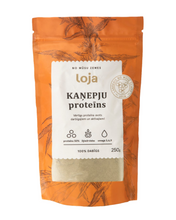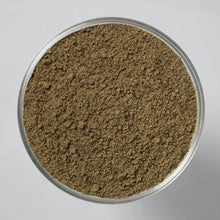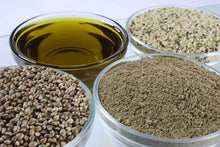In comparison to hulled hemp seeds, hemp protein is an even more valuable protein source – 30 grams contain approximately 15 grams (or 50%) of readily available pure protein.
It is particularly recommended to rapidly growing teenagers facilitating normal growth and development, as well as athletes facilitating increase and maintenance of muscle mass. The recommended daily intake is 1.2–1.4 g/kg for endurance athletes and 1.4–1.8 g/kg for strength athletes.
Hemp protein also contains omega-3 and omega-6 essential fatty acids, fiber, as well as such microminerals as magnesium, iron, potassium, and phosphorus, and vitamins – E, B1, B2, and B6.
- Protein: it is the most important component of living organisms, since it can be found in every cell, and it promotes normal growth and development, as well as increases and maintenance of muscle mass. The role of protein is characterized by the composition of essential amino acids which are not synthesized by the body and must be consumed through food. Hemp seeds contain all the essential amino acids which are necessary for adults.
- Omega-3: alpha-linolenic acid (ALA) helps to maintain a normal blood cholesterol level decreasing the risk for the development of cardiovascular disease. Three tablespoons of hemp seeds ensure 2 grams of the beneficial ALA which is the recommended daily intake!
- Fiber: promotes normal bowel function and produces a feeling of satiety. Hemp contains insoluble fiber that absorbs water; therefore, more liquid must be consumed.
- Magnesium: gives strength and energy by reducing fatigue and weakness, as well as promotes protein synthesis.
- Iron: promotes red blood cell and hemoglobin production ensuring oxygen transportation in the body, as well as the functioning of the immune system.
- Potassium: Helps to maintain healthy blood pressure, promotes muscle and nervous system function.
- Phosphorus: facilitates cell membrane function, promotes normal bone and tooth development.
- Vitamin E: a natural antioxidant that provides cell protection against oxidative stress and helps the body fight free radicals.
- Vitamin B1: promotes normal function of the nervous system and the heart.
- Vitamin B2: promotes normal iron metabolism in the body, protects cells against oxidative stress, and reduces fatigue and weakness.
- Vitamin B6: improves glycogen metabolism and ensures hormonal regulation, promotes red blood cell production and normal function of the nervous system.
We recommend using it by adding to yogurt, shakes, fruit and vegetable smoothies, or salads.
WHY ARE HEMP SEEDS SO GREAT?
- A SUPERFOOD that stands out among other plant products with its nutritional value due to its unique nutrient composition.
- A complete source of protein that contains considerably more essential amino acids than other plant products.
- The protein contained in the product is readily available to the human body.
- High in unsaturated fatty acids, including essential omega-3 and omega-6 fatty acids which are crucial to the body and which can be obtained only from food. Hemp seeds have a higher content of these fatty acids than other plant products.
- High in omega-3 fatty acids – three tablespoons of hemp seeds ensure 2 grams of the beneficial alpha-linolenic acid (ALA) which is the recommended daily intake.
- The ratio of omega-3 and omega-6 fatty acids is 1:3 which is considered to be optimal for human health.
- A source of microminerals – hemp seeds are particularly rich in magnesium, iron, potassium, and phosphorus.
- A source of vitamins – hemp seeds are particularly rich in vitamin E, B1, B2, and B6.
- One of the few seeds containing chlorophyll.
- The seeds have a low glycaemic index – when consuming them, blood glucose level rises slowly; therefore, hemp is also suitable in the case of diabetes.
- Does not contain allergens and gluten.
- Hemp seeds and their products have a wide range of applications – as a snack between meals and addition to various dishes.
- Made in Latvia from locally grown hemp.
- A healthy product with excellent nutritional value and pleasant taste!








